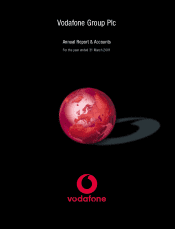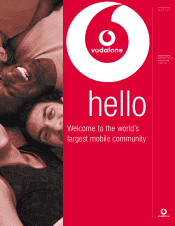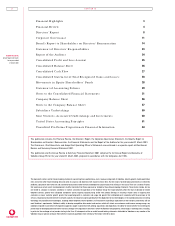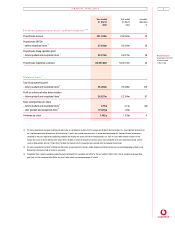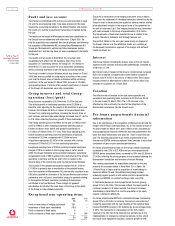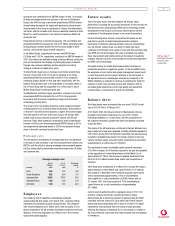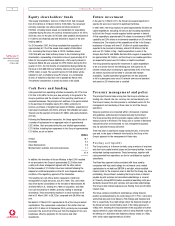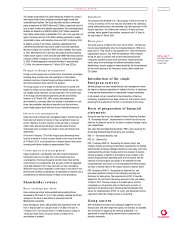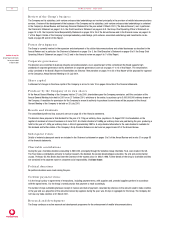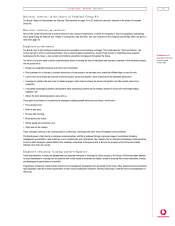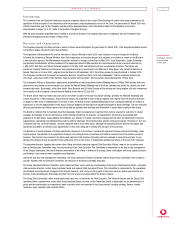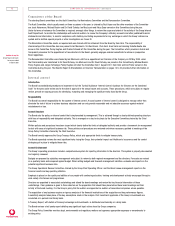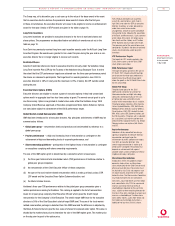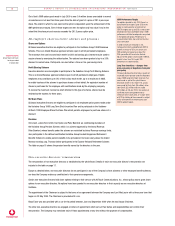Vodafone 2001 Annual Report Download - page 8
Download and view the complete annual report
Please find page 8 of the 2001 Vodafone annual report below. You can navigate through the pages in the report by either clicking on the pages listed below, or by using the keyword search tool below to find specific information within the annual report.
6FINANCIAL REVIEW
Vodafone Group Plc
Annual Report & Accounts
for the year ended
31 March 2001
Equity shareholders’ funds
Total equity shareholders’ funds at 31 March 2001 had increased
from £140,833m at 31 March 2000 to £145,393m. The movement
primarily comprises new share capital and share premium of
£9,950m, including shares issued as consideration for acquisitions
completed during the year, net currency translation gains of £5,197m,
offset by a loss for the year of £9,763m (after goodwill amortisation of
£11,882m) and dividends paid and declared in respect of the year
totalling £887m.
On 29 December 2000, the Group completed the acquisition of
approximately 52.1% of the issued share capital of Airtel Móvil
S.A., increasing the Group’s stake to 73.8%. Vodafone issued
3,097,446,624 new listed ordinary shares to the transferring Airtel
shareholders, representing a transaction value of approximately £7.9
billion for the acquired shares. Additionally, a 25% equity interest in
Swisscom Mobile SA was acquired for CHF4.5 billion during the first
quarter of 2001, the first tranche of consideration being satisfied by
the issue of 422,869,008 new Vodafone shares and the payment of
CHF25 million in cash. The second tranche of £0.98 billion will be
satisfied in cash or Vodafone Group Plc shares, or a combination
of both, at Vodafone’s discretion and is payable by March 2002.
The deferred consideration is shown as shares to be issued.
Cash fl ows and funding
Cash generated from operating activities increased by £2,077m from
£2,510m to £4,587m for the year, due primarily to the growth in the
Group’s operations and the inclusion of the operating cash flows of
acquired businesses. The principal cash outflows in the period related
to the purchase of intangible assets (£13,163m), primarily 3G
licences, purchases of tangible fixed assets (£3,698m), acquisitions of
fixed asset investments (£3,254m), primarily China Mobile and Japan
Telecom and the payment of taxation (£1,585m) and equity dividends
(£773m).
Following the Mannesmann transaction, the Group agreed the sale of
a number of businesses for an aggregate value of approximately
£33.3 billion. Cash proceeds during the year totalled approximately
£27.9 billion, including loan repayments to the Group of approximately
£1.9 billion, as set out below:
£billion
Orange 18.7
Infostrada 5.2
Atecs Mannesmann 2.9
Mannesmann’s watches and clocks businesses 1.1
––––––
27.9
––––––
In addition, the formation of Verizon Wireless in April 2000 resulted
in net proceeds to the Group of approximately £2.5 billion from
a debt push-down arrangement agreed with the other parties.
Further proceeds of £1.8 billion have been realised following the
disposal of conflicted properties in the US, such disposals being a
condition of the regulatory approval of the transaction.
The resulting net cash inflow, before repayment of debt and
management of liquid resources, was £13,744m. This cash inflow
was offset by the consolidation of the net debt of Mannesmann AG
and Airtel Móvil S.A., totalling £13,184m at acquisition, and other
non-cash movements of £639m, primarily relating to exchange
movements. These movements resulted in a small increase in net
debt at 31 March 2001 to £6,722m, compared with £6,643m last
year.
Net debt at 31 March 2001 represented 5.4% of the Group’s market
capitalisation. This represented a reduction of £6.5 billion from net
debt of £13.2 billion at 30 September 2000, primarily due to proceeds
received in the second half of the year from the disposal of non-core
businesses, offset by payments for 3G licences and other
investments.
Future investment
In the year to 31 March 2001, the Group has acquired spectrum to
operate 3G services in most of its significant territories.
In 2001/2002, the Group expects to spend approximately £5 billion on
capital expenditure, excluding 3G licences but including expenditure
by Eircell, the Group’s recently acquired mobile operator in Ireland.
Of this expenditure, approximately 3% relates to investment in GPRS
capability and 20% relates to incremental expenditure on 3G network
infrastructure. The majority of this expenditure will be in the Group’s
businesses in Europe, with over £1.0 billion of capital expenditure
expected to be incurred in Germany, almost £0.9 billion in the UK
and over £0.7 billion in Italy. Capital expenditure in each of the
Group’s Asia Pacific and Middle East and Africa regions is expected to
be approximately £0.2 billion, and the Group’s non-mobile operations
are expected to spend over £0.3 billion on capital investment.
The Group presently expects the investment in capital expenditure
to be at a similar level for the following year, with spend on 3G
network infrastructure increasing to approximately 50% of the total.
3G network launches will be timed to coincide with handset
availability. Capital expenditure programmes are then projected
to fall in subsequent years once 3G network services are launched
and spend on 2G infrastructure is curtailed.
Treasury management and policy
The principal financial risks arising from the Group’s activities are
funding risk, interest rate risk, currency risk and counterparty risk.
The Group’s treasury function provides a centralised service for the
management and monitoring of these risks for all of the Group’s
operations.
Treasury operations are conducted within a framework of policies
and guidelines authorised and reviewed annually by the Board.
The Group accounting function provides regular update reports of
treasury activity to the Board. The Group uses a number of derivative
instruments which are transacted, for risk management purposes
only, by specialist treasury personnel.
There has been no significant change during the year, or since the
year end, to the types of financial risks faced by the Group or the
Group’s approach to the management of those risks.
Fu n din g an d liquidity
The Group’s policy is to borrow centrally, using a mixture of long term
and short term capital market issues and borrowing facilities, to meet
anticipated funding requirements. These borrowings, together with
cash generated from operations, are lent or contributed as equity to
subsidiaries.
The Board has approved ratios consistent with those used by
companies with high credit ratings for net interest cover, market
capitalisation to net debt and EBITDA to net debt, which establish
internal limits for the maximum level of debt that the Group may have
outstanding. Group interest, excluding the Group’s share of interest
payable by joint ventures and associated undertakings, is covered
6.2 times by Group EBITDA (before exceptional operating costs) plus
dividends received from joint ventures and associated undertakings.
The Group’s main interest exposures are Sterling, Euro and US dollar
interest rates.
The Group remains committed to maintaining a strong financial
position as demonstrated by its credit ratings of P-1/F1/A-1 short term
and A2/A/A long term from Moody’s, Fitch Ratings and Standard and
Poor’s, respectively. The credit ratings reflect the financial strength of
the Group and were reconfirmed by each of the rating agencies on
2 May 2001, following the announcement of the acquisition of further
equity interests in Japan and Spain, which is being financed in part by
the offering of 1.825 billion new Vodafone ordinary shares on 2 May
2001 which raised approximately £3.5 billion.

